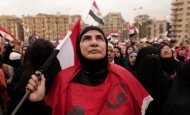By Jacob Lippincott


An escalating conflict is threatening to turn a nasty parliamentary debate into something more akin to a civil war
CAIRO, EGYPT — Tensions that have been steadily brewing between secularists and Islamists exploded on Wednesday in Heliopolis, an upscale suburb of Cairo near the presidential palace.
A few dozen secularists were camped out in front of the palace, hoping
to put pressure on the Islamist president, when thousands of Islamists
tore down their tents and chased them away.
The secularists returned in force, armed to the teeth with petrol bombs,
truncheons, knives, and a few guns. The Islamists were anticipating
this, and had a similar array of armaments. They seemed eager for a
fight.
While police using tear gas were able to move the violence off major
avenues, the intense fighting moved into side streets, where police made
no effort of any kind to intervene. The conflict lasted late into the
night. So far, at least 6 people have been confirmed dead, and 450 were
seriously wounded.
Sadly, this is just the latest battle in an escalating conflict that is
threatening to turn a nasty parliamentary debate into something more
akin to a civil war.
As it stands now, both sides have made it clear that they would rather
enter another round of deadly street battles than engage in any sort of
political dialogue. It hasn't always been this way.
As little as a year ago, the leftist youth movement and the Muslim Brotherhood,
both of which make up the core of their respective factions, were
allied against their common enemies in the police, army, and other
remnants of the old Mubarak regime. They stood side by side in
Tahrir Square against military rule, and fought and died together as the
old guard enacted one brutal crackdown after another.
However, this all changed after the first free elections put the Muslim
Brotherhood in firm control. The leftists were disturbed by the Brotherhood's
growing ties with more radical Islamists and their disinterest in
consensus politics. The widespread belief in the leftist camp is that
the Brotherhood used trickery and bribery to steal the election, and is
now in the process of setting up a theocratic, authoritarian regime.
The Islamists, for their part, see the secularists as sore losers who
are completely out of step with mainstream Egyptian sentiment and
increasingly willing to subvert democracy and ally themselves with
former regime officials to push their agenda.
The conflict has quickly escalated, both in parliament and on the
streets, leaving young people on both sides dead — and badly needed
political progress stalled.
I was in Heliopolis during the violence, and was able to spend time running around with both Islamist and secularist fighters.
Leftists advance behind a shield wall in Cairo on Dec. 5.
Photo Courtesy Jacob Lippincott
What disturbed me most was the intense loathing these former allies
clearly have for one another. This was not a case of angry young men at
the fringes of each movement awkwardly lashing out at one another.
Instead, it was a well-organized, concerted effort on the part of both
movements to dominate the other side using brutal violence.
Behind the Islamist lines, old men in blazers and button-down shirts,
who looked like they would have been more at home smoking shisha in a
cafe then fighting street battles, vigorously broke paving stones into
smaller, more throwable pieces to be used by their younger comrades at
the front lines.
In secularist territory, pretty young women in stylish hijabs collected
stones and made molotov cocktails for their men while hurling obscene
insults at the Islamists.

Young men and boys scaled the balconies of other people's apartments to
throw petrol bombs directly onto the heads of kids their own age, all
the while screaming out the names of friends slain in previous battles,
as if causing more young deaths was the best way to honor them.
Both sides brought guns and bombs to the showdown, and both sides seemed
equally interested in killing and dying. However, it was an incident
behind the Islamist lines that disturbed me most.
Around 9 p.m. on Wednesday night, I saw Islamists take a small
intersection that leftists had previously occupied. Some of the younger
leftist fighters were not able to get away and were seized by their
enemies, who beat and dragged them toward the center of Islamist
territory. The boys were barely conscious and bleeding from head wounds.
They were soon surrounded by men twice and three times their age, who
began beating them with sticks, stones, and their bare hands.
To their credit, a small number of Islamists began trying to form a
human shield around the boys, shouting "Hallas!" (enough!) I couldn't
help myself and ran to try and protect a boy of about 14. However, I
didn't do any good, and we were all pushed aside by a mob of wild-eyed
middle-aged men, too afraid to actually stand on the front lines, but
still extremely eager to take part in the bloodletting.
As I watched the boys being dragged off and beaten, I had two immediate
thoughts. First, I badly needed to get back to the safety of my
apartment. And second, Egypt is in serious trouble.
After Wednesday night's violence, both sides have more martyrs to be
avenged, martyrs who died not at the hands of the police or military,
but who were killed by fellow civilian activists.
The struggle between the state and revolutionaries has now been replaced
by a bitter partisan battle. The revolutionary movement is tearing
itself apart. It's hard to not be worried about what the future will
bring, and there is a creeping realization here in Egypt that the worst
very well could be yet to come.
Jake Lippincott earned a degree
in Middle Eastern Studies at Hampshire College. He worked in Tunis
during the popular uprising there, and is now based in Cairo.
No comments:
Post a Comment